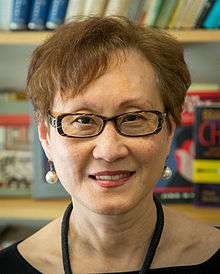Jing Wang (professor)
Jing Wang is Professor of Chinese media and Cultural Studies and S.C. Fang Professor of Chinese Language & Culture at Massachusetts Institute of Technology. She is jointly appointed to MIT's Comparative Media Studies and Global Studies & Languages.[1]

Jing Wang is the founder and organizer of MIT’s New Media Action Lab.[2] In spring 2009, Wang launched an NGO2.0.[3]
Wang started working with Creative Commons in 2006 and serves as the Chair of the International Advisory Board of Creative Commons Mainland China. She was appointed to serve on the Advisory Board for Wikimedia Foundation in 2010. She serves on the editorial and advisory boards of ten academic journals in the US, Australia, Taiwan, Hong Kong, and the UK.
Books
- Brand New China: Advertising, Media, and Commercial Culture, Harvard University Press 2008.
- High Culture Fever: Politics, Aesthetics, and Ideology in Deng's China,Duke University Press, 1996.
- The Story of Stone: Intertextuality, Ancient Chinese Stone Lore, and the Stone Symbolism of "Dream of the Red Chamber," "Water Margin," and “Journey to the West." University Press, 1992.
Edited
Locating China: Space, Place, and Popular Culture. In the series of “China in Transition” (ed. David SG Goodman). London and New York: Routledge, 2005. Paperback edition, 2006.
With Tani Barlow, Cinema and Desire: Feminist Marxism and the Cultural Politics in the Work of Dai Jinhua. New York & London: Verso. 2002. Chinese Popular Culture and the State, a special issue for positions: east Asia cultures critique, 9:1 (spring 2001). [Nominated for the 2001 MLA Council of Editors of Learned Journals Award for the category of the Best Special Issue].
China's Avant-Garde Fiction: An Anthology. Durham and London: Duke University Press, 1998.[Second Printing, 2004].
Candy R. Wei Memorial Scholarship
Jing Wang established a scholarship fund in at the University of Michigan School of Art & Design in 2001 to commemorate her daughter Candy R. Wei. The recipients of this fund made individual contributions to this site by submitting works inspired during their study abroad.
References
- MIT. "Jing Wang." Retrieved Jan 10, 2013.
- New Media Action Lab, MIT http://web.mit.edu/newmediaactionlab/
- NGO2.0 Project http://www.ngo20.org/